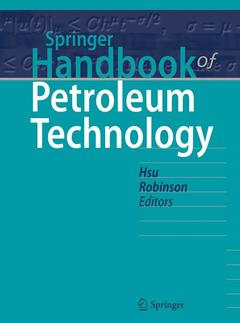Springer Handbook of Petroleum Technology (2nd Ed., 2nd ed. 2017) Springer Handbooks Series
Coordonnateurs : Hsu Chang Samuel, Robinson Paul R.

Dr. Chang Samuel Hsu had over 32 year experience at ExxonMobil and BP before joining in Florida State University six years ago to establish the Future Fuels Institute. He also established the Refinery of the Future Lab at BP. Currently, he is an Adjunct Professor at Department of Chemical and Biomedical Engineering of Florida A&M University/Florida State University and also at College of Chemical Engineering of China University of Petroleum in Beijing. In 2012, he founded Petro Bio Consulting, LLC. Dr. Hsu was the first researcher to introduce ultrahigh resolution Fourier-transform ion cyclotron resonance mass spectrometry (FT-ICR MS) for in-depth molecular characterization of petroleum fractions. He was one of the pioneers to develop tandem mass spectrometry (MS/MS) at Exxon to provide an additional dimension for the determination of molecular structure of the components in complex mixtures. Dr. Hsu’s research interest covers petroleum (both upstream and downstream), coal, shale and biomass oils. His current focuses are novel characterization of petroleum biomarkers for exploration and exploitation, and heavy hydrocarbon characterization for hydroprocessing, catalytic cracking, coking and fuels/lubes analyses. He also has extensive experience in environmental damage assessment and remediation for oil spills.
Dr. Paul Robinson earned BS (Honors) and MA degrees at the University of Missouri at Columbia. He spent a year at the Scripps Institution of Oceanography, then moved to the University of California at San Diego, which rewarded him with a PhD in Chemistry. After two years as a Visiting Assistant Professor at the University of Illinois at Champaign-Urbana, he began his long career in energy, starting at the Oak Ridge National Laboratory, where he studied hydrogen energy systems. Subsequently, at the Science and Technology Division of Unocal Corporation, he became involved in catalysis research. He earned several patents, some for com
Comprehensively describes all aspects of petroleum technology, including exploration, transportation and refining of petroleum and natural gas
Provides an extensive and comprehensive review of state-of-the-art techniques and technologies used in the industry
Offers a reference resource for the oil-refining and petrochemical-production businesses
Date de parution : 12-2017
Ouvrage de 1238 p.
19.3x26 cm


